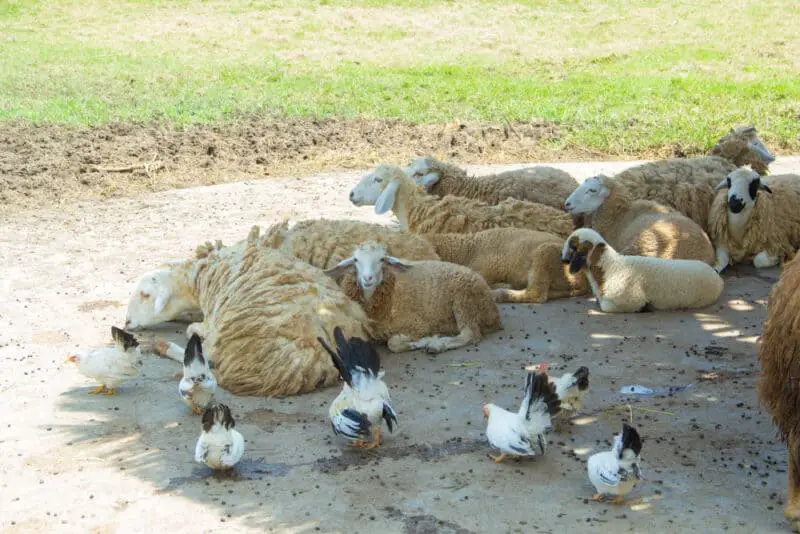Sheep and chickens can live together and this is because chickens get along with most farm animals, even though they have a dominant pecking order within their own flocks. Free range chickens go about their business happily foraging as long as the farm animals that are around do not tramp down or harm them.
Table of Contents
Benefits of Keeping Sheep and Chickens Together
Parasite and Disease Control
Having chickens and sheep in the same space significantly reduces the spread of diseases and parasites. Parasite transmittion is minimal because most diseases that affect both sheep and chickens are species specific. There may be cases, but they are not common. Chickens eat any slugs and snails that wander through the grazing area and they help with protecting the sheep form deer worm.
When you have sheep and chickens in one place, some of the common health issues can be solved by providing the animals separate housing. Encouraging the chickens to sleep in their own quarters at night but allowing them to share pastures during the day. Keeping the sheep out of the chicken coop and the chickens out of the sheep barn will make cohabitation quite easier.
Predator Control
Chickens provide companionship and stability for larger farm animals. They benefit a great deal from the idea of safety in numbers. Having larger animals like sheep discourages smaller predators from stalking the chickens.
In as much as having sheep and chickens in one place helps with predator control, there is need to take precautionary measures that are necessary. When building fences, it is important to keep both animals in mind, sheep and chickens have different limitations and capabilities. It is always a good idea to use page wire fencing because the gaps are small enough so chickens can not pass through but tall enough that sheep cannot jump over.
What Animals Can Live With Chickens?
As social animals, a wide range of animals can live with chickens.
A large flock of free range chickens can cross graze after horses and cows, eagerly picking through dung and other particles for larvae, maggots and parasites. Most of these parasites are species specific and chickens are able to safely disrupt their life cycle by eating them and they can get away with it. Chickens also keep fly populations down by eating maggots and they helpfully spread manure and mix it with soil. When their safety is not threatened, chickens tend to get along just fine with other animals.
Chickens should not be allowed to forage with animals that have been given chemical de-wormers or any medication.
It is easier to mix chickens with other species that are not members of the bird family because when mixed, it is easier to transfer diseases and this can cause in increase in mortality rates and these include geese and ducks.
What Animals Will Kill Chickens?
Predators are everywhere, no flock is ever completely safe from some carnivorous species that will kill the chickens. Raccoons and domestic dogs are known to be the ones that kill more chickens than any other animals and they are found in both urban and rural areas. Pigs,farm animals themselves, are also on the list of predators and they can not be mixed with chickens because they are known to kill and eat them.
These animals that normally kill and eat chickens also include hawks, house cats, snakes and foxes.
Preventing predation is far more effective than shooting and trapping the predators.
Sheep and Chicken Feed
When keeping sheep and chickens in the same pen, there is need to keep the sheep away from the chicken feed. Chickens are omnivores and their feed may contain animal by products which should not be consumed by sheep.
Also, although not necessarily poisonous, chicken feed is bad for sheep as it may have too much copper than they can tolerate. Poultry feed is not safe for sheep to consume because it can cause bloating in sheep because the grains allow for the wrong sort of rumen bacteria to thrive thereby producing gas which froths up and cannot escape. The result of this is stomach contents becoming too acidic and if the problem is not addressed in good time, the end result can be death.
On the other hand, chickens will gladly pick on sheep mix and take out the interesting bits without having much trouble. Sheep feed is not a balanced ration for chickens so eating it occasionally with everything else that chickens get from foraging adds variety to their regular rations. Therefore, ruminants and chickens go well together as long as their feed is separated.
Disadvantages of Keeping Sheep and Chickens Together
When keeping sheep and chickens, housing them together is a bad idea but letting them share the same forage areas can work out just fine. Animals can be kept in mixed flocks as mixed poultry or as poultry and ruminants but there are risks that are associated with this practice which include the spread of certain diseases and parasites.
The salmonella bacteria is mainly found in the intestines of chickens and chickens are not really particular about where they leave their droppings. The bacteria is shared via nursing ewes, udders of ewes can host the bacteria and can easily transfer to the nursing young. Even in small dosses, the bacteria can be lethal and is very fatal to the young lambs.
Contaminated feed, bedding and drinking water are the most common methods of transmittion of most diseases so if a farmer makes effort to keep the spaces clean, it lowers the risk. Keeping chickens away from from sheep’s drinking water goes a long way when trying to prevent diseases. Sheep are not likely to deliberately eat chicken manure but chickens are likely going to leave their droppings anywhere.
Individual animals each have their own unique personal experiences and preferences therefore there is need for enough space, it gives a chance to both sheep and chickens to adjust to the set up in question.

